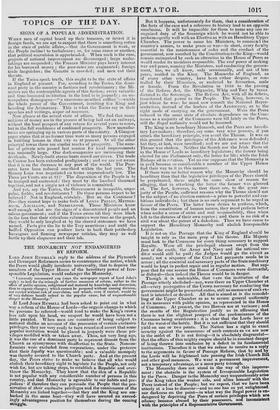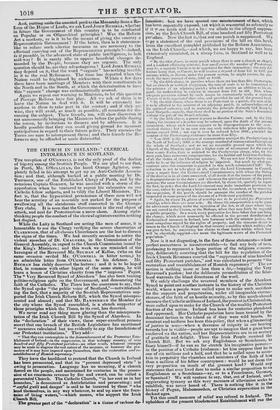THE MONARCHY NOT ENDANGERED BY REFORM.
LORD JOHN RUSSELL'S reply to the address of the Plymouth and Devonport Reformers seems to countenance the notion, which the Peers would gladly inculcate universally, that to deprive the members of the Upper House of the hereditary power of Irre- sponsible Legislation, would endanger the Monarchy.
" I earnestly recommend you (says the newspaper report of Lord John's reply) to look for the triumph of further measures of reform, rather to the effect of public opinion, enlightened and matured by knowledge and discussion, than to organic changes ; which cannot be proposed without causing division, nor carried without risk of convulsion, and which, even if carried, would be of very dubious benefit indeed to the popular cause, but of unquestionable danger to the Monarchy."
If Lord JOHN RUSSELL had been asked to point out in what way a reform of the House of Lords—the organic change to which we presume he referred—would tend to make the King's crown less safe upon his head, we suspect he would have been not a little puzzled. When men are conscious of being subject to national dislike on account of the possession of certain exclusive privileges, they are very ready to turn round and assert that some popular institution would be placed in jeopardy were those pri- vileges meddled with or taken away. Thus, not very long ago, it was the cue of a dominant party to represent dissent from the Church as synonymous with disaffection to the State. Noncon- formistswere excluded from corporations, under the pretence that their loyally was questionable ; and a valuable monopoly was thereby secured to the Church party. And at the present day, the Peers strive to make us believe that all who would abolish their hereditary right to legislate for the People, not only wish for, but are taking steps, to establish a Republic and over- throw the Monarchy. They know that the idea of a Republic is not popular with any considerable number of persons in this country, and that Monarchy is agreeable to our habits and pre- judices • if therefore they can persuade the People that the pre- servation of their exclusive privileges and the continuance of the Monarchy are linked together—that they and the King are em- barked in the same boat—they will have secured an exceed- ingly advantageous position for themselves during the coming struggle. But it happens, unfortunately for them, that a consideration of the facts of the case and a reference to history lead to an opposite conclusion. It will be impossible for them to name any one re- cognized duty of the Sovereign which he would not be able to perform equally well with an Elective as with an Hereditary Upper
Chamber. The power to name his Ministers, to command the country's armies, to make peace or war—in short, every faculty essential to the maintenance of order and the conduct of the
government, now ascribed by the Constitution to the King—would remain unimpaired by such an alteration in the House of Peers as would render its members responsible. The real power of making war and peace, naming the Ministers. and conducting the govern- ment, has, we all know, only occasionally, and not of late years, resided in the King. The Monarchs of England, as of every other country, have been either despots, or con- trolled by their Ministers, or enslaved by favourites, male or female. From the Revolution in 1688 to the passing of the Reform Act, the Oligarchy, Whig and Tory by turns dictated to the Sovereign. The Reform Act, with all its defects, transferred that power to the People. The King, however, is just where he was: he must now consult the National Repre- sentatives, instead of the leaders of the Aristocracy, as to the right mode of carrying on the government. Were the Peers reduced to the same state of absolute dependence on the Com- mons as a majority of the Commons were till lately on the Peers, still the Royal authority would not be lessened.
The King is an hereditary Monarch, and the Peers are heredi- tary Lawmakers ; therefore, say some very wise persons, if you attack the hereditary principle, you assail the Throne. It was on this ground that the privileges of the Aldermen were defended ; but they, at last, were sacrificed; and we are not aware that the Throne was shaken. Neither the Scotch nor the Irish Peers sit in the House of Lords as hereditary legislators; the former being elected for one Parliament only, the latter for life; while the Irish Bishops sit in rotation. Yet no one supposes that the Monarchy is in peril because so considerable a number of the Upper House find their way to it in this manner. If there were no better reason why the Monarchy should be hereditary than that the legislative privileges of the Peers should be perpetuated, there might be some show of reason for alleging, that in attacking the latter the former was glanced at. The fact, however, is, that there are, to the great ma- jority of the People, sufficient reasons why the Throne should not be the subject if an election contest—a prize to powerful and am- bitious individuals ; but there is no such argument to be urged in favour of the Peers. The latter have duties to perform, which, from the constitution of human nature, they must perform better when under a sense of strict and real responsibility, than when left to the dictates of their own caprice ; and there is no risk of a civil war about the patent of a dukedom. Thus we have cause to support the Hereditary Monarchy and abolish Irresponsible Legislation. It is not on the Peerage that the King of England should be taught to rely as the main prop of hii throne. His Majesty must look to .the Commons for every thing necessary to support Royalty. Were all the privileged classes swept from the face of the earth, the Army and Navy and the national cre- ditor would still be paid ; the Judges would go the circuit as usual ; not a sixpence of the Civil List payments needs be in arrear ; all the essential and necessary parts of the State machinery would be kept in perfect repair and in regular motion. But sup- pose that for one session the House of Commons were distrustful, or disloyal—then indeed the Throne would be in danger.
Though it is undeniable, that were the institution of the Peerage utterly abolished—nay, were there no Upper Chamber at all—every prerogative of the Crown necessary for conducting the government might be preserved entire, still no measure of such ex- tent is intended or desired. All that is aimed at is the remodel- ling of the Upper Chamber so as to secure general uniformity in its measures with public opinion, as represented in the House of Commons. At present, the two Houses are at variance ; and the results of the Registration justify us in affirming that there is not the slightest prospect of the predominance of the Commons being overthrown : it is clear that the Lords have so far the worst of the battle. But it is not sufficient that they should yield on one or two points. The Nation has a right to exact security against the recurrence of such contests as we are now in the midst of. It is not fitting—it is absolutely disgraceful— that the affairs of this mighty empire should be in constant danger of being thrown into confusion by a defect in its fundamental institutions. Therefore it is that we refuse to receive as a reply to the arguments in favour of Peerage Reform, that by and by the Lords will be frightened into passing the Irish Church Bill and other good measures. We want a permanent improvement, not a temporary advantage, or a mere party triumph.
The Monarchy does not stand in the way of this improve- ment : the obstacle is the system of Irresponsible Legislation by the Peers. Danger to the Monarchy may unquestionably arise if the King takes the weaker side, and allies himself with the Peers instead of the People; but we repeat, that we have been utterly at a loss to discover—and no one has as yet enlightened our darkness on the point—in what way the Regal power is en- dangered by depriving the Peers of certain privileges which are odious; because abused by their possessors. and inconsistent with the principles of a Representative Government.
And, putting aside the asserted peril toadae-Manarchy from a Re- form of the House of Lords, we ask Lord Jotter RUSSELL, whether in future the Government of this country is to be conducted on Popular or on Oligarchical principles ? Was the Reform Act a mockery, or is it to be the means of giving. the country a Representative Government ? If the latter, then is it statesman- like to refuse such ulterior measures as are necessary to the effectual carrying out of the Representative principle ?—indeed, is it possible, in the advanced state of public intelligence, to halt mid-way ? It is surely idle to oppose beneficial changes de- manded by the People, because they are organic. The only question should be, are they advantageous ? Lord JoHN RUSSELL may depend on it, that the word "organic" has nothing terrible in it to the real Reformers. The time has departed when the Nation could be frightened by nicknames. Within a few days there have been meetings of Members with their constituents in the North and in the South, at which the determination to have this " organic" change was enthusiastically avowed. Again we repeat our warning to Ministers, to let this question of Peerage Reform have fair play. All e e ask of them is to leave the Nation to deal with it. It will be extremely ha- zardous to them to take part in the contest ; and if they are wise, they will avoid, as much as possible, all occasions for dis- cussing the subject. Their friends, too, will show discretion in not unnecessarily bringing the Ministers before the public during the recess, by invitations to dinners and by addresses. It is hardly possible that they can avoid giving ground for incorrect anticipations in regard to their future policy. Their enemies the Tories are sure to misrepresent them ; and their friends the Re- formers may be offended or made distrustful.



























 Previous page
Previous page